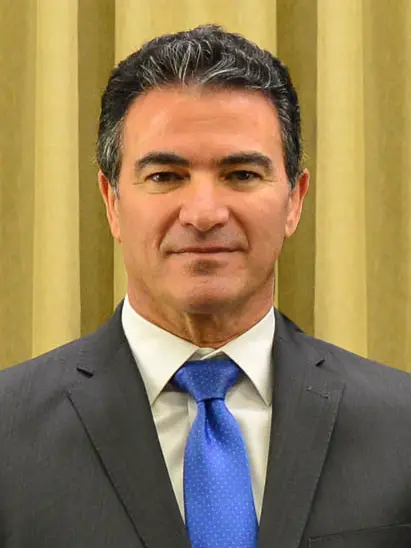Yossi Cohen
(1961- )

Joseph (Yossi) Cohen is an Israeli intelligence officer, diplomat, and public figure who served as the 12th Director of the Mossad from 2016 to 2021. Known for his operational daring and close ties to Israeli leadership, Cohen oversaw some of the Mossad’s most consequential missions, including the theft of Iran’s nuclear archive and the expansion of Israel’s clandestine ties with Arab states.
Cohen was born in Jerusalem in 1961 to a religious Jewish family. He grew up in a traditional environment that emphasized Jewish and Zionist values, which he later cited as a guiding force in his career. After serving in the Israel Defense Forces’ Airborne Nahal Brigade, where he fought in the First Lebanon War, Cohen joined the Mossad in 1983 and trained as an intelligence-gathering officer. He later earned a B.A. in Social Sciences from Bar Ilan University, graduating summa cum laude in 1997.
Cohen’s career in the Mossad spanned decades. Early on, he specialized in HUMINT (human intelligence), rising to become head of the Mossad’s “Tzomet” Division, which manages field officers worldwide. His leadership in covert operations earned him two Israel Defense Prizes in 2003 and 2006. In 2011, he was appointed Deputy Director of the Mossad and Head of the Operations Directorate.
In 2013, Prime Minister Benjamin Netanyahu selected Cohen as his National Security Advisor and Head of the National Security Council, a role he held until he was appointed Mossad Director in January 2016.
As Mossad Director, Cohen prioritized countering Iran’s nuclear program. He personally oversaw the daring 2018 operation in Tehran that seized Iran’s nuclear archives, an intelligence breakthrough that helped shape U.S. withdrawal from the Iran nuclear deal. He also played a key role in covert sabotage campaigns against Iranian facilities and scientists, continuing efforts he had led since the mid-2000s.
Under Cohen’s leadership, the Mossad expanded ties with intelligence services across the Middle East and Africa. He was instrumental in laying the groundwork for Israel’s normalization agreements with the United Arab Emirates and Bahrain in 2020, known as the Abraham Accords. His tenure also saw advances in cyber operations and intelligence cooperation with global agencies, earning him international recognition. In 2021, CIA Director William J. Burns presented Cohen with the George J. Tenet Award for contributions to joint U.S.-Israel operations.
Unlike many of his predecessors, Cohen maintained a relatively public profile. He cultivated relationships with journalists and diplomats, often projecting a polished and approachable image. Known for his elegance and charisma, he was dubbed “the model spy,” frequently seen as a potential successor to Netanyahu due to his pragmatism and political instincts.
After leaving the Mossad, Cohen entered the private sector and began publishing reflections on his career. In 2025, he released his memoir, The Sword of Freedom, detailing his role in Israel’s intelligence operations and diplomacy. That same year, he hinted at a possible run for prime minister, stating, “To make a real difference, I need to be prime minister.”
In a September 2025 interview, Cohen reflected on the failures of October 7, where he called for a state commission of inquiry and acknowledged political responsibility alongside intelligence lapses. He revealed his past efforts to convince Egypt to absorb Gazan civilians to reduce casualties temporarily, expressed that a ceasefire should be tied to a hostage deal while insisting Hamas must be defeated, and dismissed the Palestinian Authority as incapable of governing Gaza. Cohen also voiced skepticism about a future Palestinian state, opposed annexation of the West Bank to preserve negotiation prospects, praised Vladimir Putin’s strategic role in Syria despite Russia’s later alignment with Israel’s enemies, and emphasized strengthening ties with U.S. Jewry as central to Israel’s future.
Cohen is married to Aya, and the couple resides in Modi’in. They have four children and several grandchildren. Known for his strong Jewish identity, Cohen has emphasized the values of Am Yisrael, Torat Yisrael, and Eretz Yisrael as guiding principles throughout his service.
Sources: “Yossi Cohen: Inside the Mossad with a Master Spy and Elite Spymaster,” Temple Emanu-El Streicker Cultural Center.
“Joseph (Yossi) Cohen.” Ministry of National Security, (June 12, 2018).
Shimon Breitkopf,Yossi Elituv, “Yossi Cohen’s Moment,” Mishpacha Magazine, (November 6, 2019).
“Yossi Cohen | International Board 2021,” Weizmann Institute of Science, (November 11, 2021).
Yonah Jeremy Bob, “How ex-Mossad chief Yossi Cohen set stage for Israel’s attacks on Iran,” Jerusalem Post, (July 3, 2025).
“Ex-Mossad chief teases political run: ‘I should be prime minister,’” Ynet, (August 26, 2025).
Lahav Harkov, “Former Mossad chief Yossi Cohen talks covert missions, Oct. 7 failures in new book,” Jewish Insider, (September 15, 2025).
Photo: Kobi Gideon / GPO Israel, CC BY-SA 3.0, via Wikimedia Commons.


